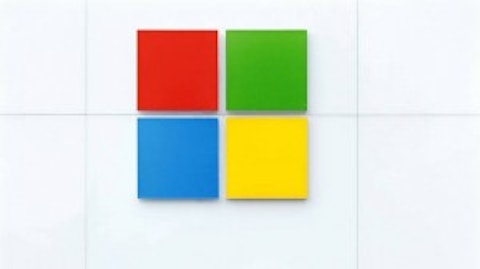When Microsoft Corporation (NASDAQ:MSFT) reported earnings last week the market did not like what it saw. The company lost about $30 billion in market value in one fell swoop as the shares dropped by $4 in value. I’ve written about why I think that Microsoft Corporation (NASDAQ:MSFT)’s quarter was a lot better than people seem to think and how the massive drop in the stock price was an overreaction, but given the results how much is Microsoft Corporation (NASDAQ:MSFT) actually worth today?
Loaded with cash

Net cash like this effectively lowers the enterprise value of the company, meaning that the cost to purchase the company outright is reduced by the value of the net cash. With Microsoft Corporation (NASDAQ:MSFT) stock trading around $32 per share the market is valuing all of Microsoft’s future profits at only $23.50 per share. Cash makes up almost 27% of the total market capitalization.
Microsoft Corporation (NASDAQ:MSFT) also pays a dividend, doling out $7.5 billion to shareholders in fiscal 2013. The dividend yield is now 2.88% after the post-earnings drop, a solid yield from a company with plenty of room to expand the dividend further. Microsoft is part of The Ultimate Dividend Portfolio.
Solid profits
Net income for the fiscal year was $21.9 billion, up from $17 billion last year. However, last year there was a large $6.2 billion goodwill impairment due to a failed acquisition, and adding that back in net income for last year was $23.2 billion. This year’s number included a $900 million inventory write-off related to the Surface RT tablet, and adding that back in net income was $22.8 billion.
This small decline in earnings was not unexpected, given that the PC market is in decline and that Microsoft derives much of its earnings from Windows and Office. It’s almost surprising that the decline in profits wasn’t bigger, and the fact that the adjusted net income was almost flat says something about the strength of Microsoft’s other businesses.
I like to look at owner earnings, a variation on free cash flow, when I’m valuing a company. Owner earnings for 2013 were roughly $22 billion, which works out to $2.60 per share. The enterprise value of Microsoft is just 9 times the owner earnings, incredibly low for a company like Microsoft.
An opportunity
I bought shares of Microsoft at the end of January for $27.75 per share, a price we’re unlikely to see again, but this massive decline opens up an opportunity to buy Microsoft at an attractive price. I’ll do a simple discounted cash flow calculation to estimate the fair value of a share of Microsoft. In order to be conservative I’ll assume that owner earnings grow at just 3% per year going forward, well below analyst expectations. For a discount rate I’ll use both 12% and 15% and use these two values to define a fair value range.
Under these assumptions the (conservative) fair value for a share of Microsoft is roughly $31 – $38. Right now Microsoft trades just above the lower bound of this range.
If earnings grow faster, say 6% per year for the next 10 years and 3% per year after that, the fair value range increases to $35.50 – $45 per share.
Cheaper than most
In the realm of big, old tech companies Microsoft is among the cheapest. International Business Machines Corp. (NYSE:IBM), which posted lackluster earnings in Q1, came roaring back in Q2 as it beat analyst estimates. International Business Machines Corp. (NYSE:IBM) is Warren Buffett’s largest technology holding, and the company has built an economic moat around its business.





